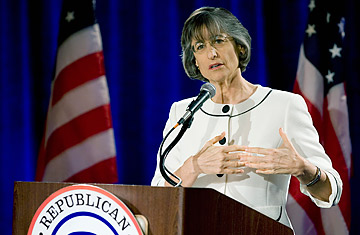
Hawaii Governor Linda Lingle
After weeks of lobbying and political maneuvering, the governor of the Aloha State vetoed a controversial measure Tuesday that would allow same-sex and unwed heterosexual couples the same protections under the law that married couples have.
Throughout the day on Tuesday, citizens on both sides of the issue protested at the Hawaii State Capitol building in Honolulu. Proponents of the bill wore rainbow leis and played music from the Rent soundtrack; opponents led prayer sessions and carried signs bearing slogans like "God loves you! So he sets boundaries."
But at 3 p.m. local time, Hawaii Governor Linda Lingle delivered the news everyone had been waiting for when she announced she had vetoed the bill, citing a "flawed" legal process by which the measure was approved by state lawmakers 31 to 20 on the last day of the legislative session in April. Lingle, a 57-year-old Republican and Hawaii's first woman governor, said she felt lawmakers had denied the public the right to weigh in on the issue with their 11th-hour voting, and she recommended that the bill go to a national vote. Due to leave office in December after serving her two terms, Lingle had until Tuesday to sign the contentious measure into law, veto it or let it be approved without her signature.
"After months of listening to Hawaii's citizens express to me in writing and in person their deeply held beliefs and heartfelt reasons for supporting or opposing the civil-unions bill, I have made the decision to veto the bill," Lingle said in a press conference at the Capitol building that was streamed live online. "I have been open and consistent to my opposition to same-gender marriage and find that the bill is essentially marriage by another name. My personal opinion is not the basis for my decision ... Neither is my veto based on my religious beliefs ... I am vetoing this bill because I have become convinced that this issue is of such of societal importance that it deserves to be decided by all the people in Hawaii."
The bill would have given the same rights, benefits, protections and responsibilities of spouses in a marriage to partners in a civil union. All couples would have been allowed to enter into a civil union — a legal contract — provided they were 18 or older, not related and not already married.
After the announcement, more than 34,000 e-mails, phone calls, faxes and letters flooded the governor's office, with 40% supporting and 60% opposing the bill. Hawaiian law does not currently permit same-sex marriage or civil unions, but two unmarried people can register for a "reciprocal beneficiary relationship" that provides some of the same legal rights and benefits as those offered to married couples. Civil unions and same-sex marriage have been debated in Hawaii since a 1993 Hawaii Supreme Court ruling that the state's refusal to grant same-sex marriage licenses was discriminatory. Voters later approved a constitutional amendment granting the legislature the right to ban same-sex marriage, but left the door open to civil unions.
Opponents of the bill immediately praised the governor's decision. "We're relieved," said Dennis Arakaki, spokesman of the Hawaii Catholic Conference, a public-policy voice for the Catholic Diocese. "From the morning until after the announcement of her decision, we've prayed. Our prayers were answered."
Representatives who helped author the bill were, not surprisingly, disappointed. A week before Lingle's decision, state lawmakers had announced they would not convene the legislature to override her veto. While the state senate had the two-thirds majority needed to override her veto, the state house did not, said Representative Blake Oshiro. "The bill's dead for this session until whatever happens with the next legislature in January," Oshiro said. "I strongly disagreed with the governor ... I think she acted out of political expediency rather than the [bill's] merits."
Voters who support the civil-unions bill are evaluating their options to move their effort forward and plan to take measures to ensure that like-minded officials are elected in the upcoming state elections. Some say they will be investigating alternative legal means as a way to obtain passage, says Tambry Young, a member of Citizens for Equal Rights. It will be up to the next legislature to decide if a new bill should be introduced or a measure should go before the voters per Lingle's suggestion, Oshiro said. Five U.S. states and the District of Columbia currently issue marriage licenses to same-sex couples, according to the National Conference of State Legislatures. New Jersey allows civil unions.
Young, who spent the day outside the governor's office with her partner and son, had hoped for a different outcome. "We've given her as much information as possible," Young says. "We're definitely disappointed ... [Lingle] moved civil rights backwards today." But, she adds, "We'll continue on."
